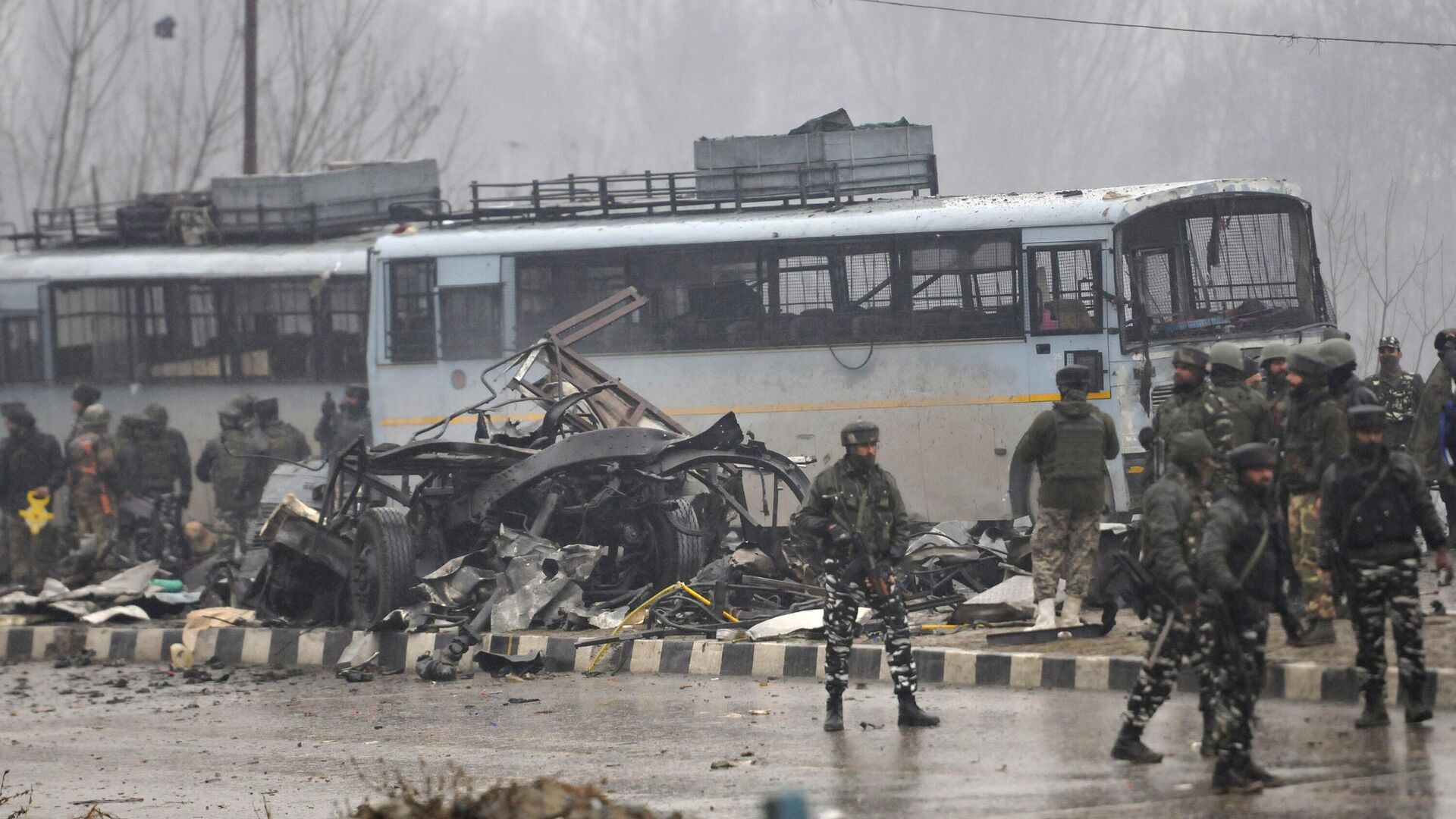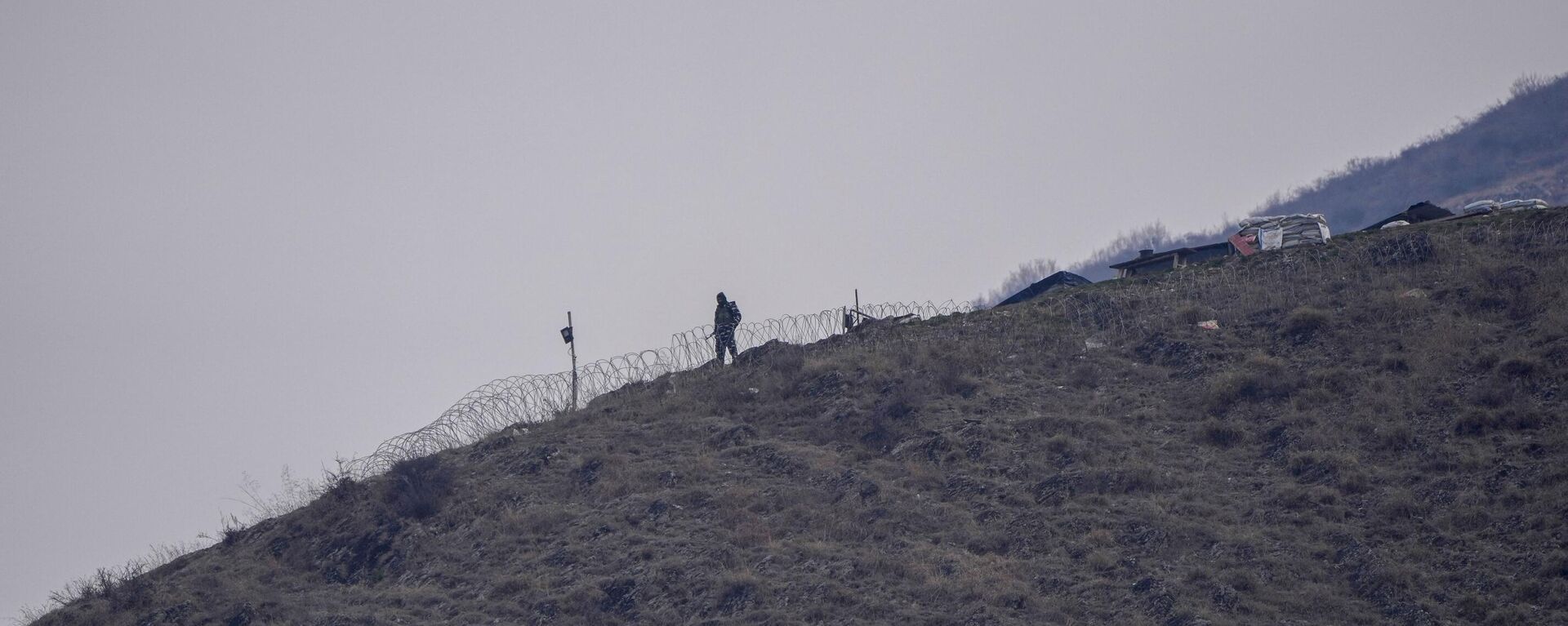https://sputniknews.in/20250214/six-years-of-pulwama-attack-how-tragedy-reshaped-indias-defence-strategy-8773118.html
Six Years of Pulwama Attack: How Tragedy Reshaped India's Defence Strategy
Six Years of Pulwama Attack: How Tragedy Reshaped India's Defence Strategy
Sputnik India
On February 14, 2019, India was struck by another terror attack when a suicide bomber attacked a convoy of CRPF personnel in Pulwama, Jammu & Kashmir, resulting in the loss of 40 soldiers and over 35 injured.
2025-02-14T20:30+0530
2025-02-14T20:30+0530
2025-02-14T22:30+0530
defenсe news
india
pakistan
jammu
indian air force (iaf)
central reserve police force (crpf)
s-400 air defense systems
2019 pulwama attack
2019 balakot airstrike
terrorism
https://cdn1.img.sputniknews.in/img/07e9/02/0e/8775088_0:153:3001:1841_1920x0_80_0_0_4453c7570b72abe20ee4e3d65641af37.jpg
As India marks the sixth anniversary of the Pulwama Terror Attack, when 40 Central Reserve Police Force personnel were killed, Indian defence experts reflect on the incident, its profound impact on national security strategy, and the subsequent military response with airstrikes in Pakistan’s Balakot.Retired Air Marshal Anil Khosla, who served as vice-chief of the Indian Air Force (IAF) during the Balakot airstrikes, recalled to Sputnik India the intense days between the Pulwama attack and the Balakot air strikes.IAF veteran emphasised the pressure and responsibility he felt in coordinating the planning and execution of the IAF's military response, which targeted a reported terror camp in Balakot, Pakistan, on February 26, 2019.The Balakot strikes marked a significant shift in India's approach to counter-terrorism, he stressed.The chosen target, a military camp, lent credibility to India's response and sent out a powerful message to Pakistan and the world that the cost of terrorism would be high in the future, Khosla highlighted.The Pulwama attack also marked a dramatic shift in India’s defence strategy, retired Air Marshal Dr Pawan Kapoor told Sputnik India.Kapoor characterised the attack as an act of cowardice sponsored by the Pakistan-based militant group Jaish-e-Mohammad*, highlighting its long-standing strategy of cross-border terrorism.India’s strike deep into Balakot sent a clear signal that the era of strategic restraint was over, he stated.The shift to a more assertive policy of military action against sponsored terrorism reflected India’s zero tolerance for terror, he added.In the wake of Pulwama, India accelerated the modernisation of its armed forces and defence procurement, the veteran noted.He highlighted that these steps were taken to ensure that India would not be caught off guard in the future and would have the capacity to deter or respond to any future threats effectively.Valuable lessons have emerged over the past six years about our preparedness, intelligence, and, most importantly, the sacrifices made, retired Commodore Seshadri Vasan told Sputnik India.Though India has made significant progress in intelligence-gathering capabilities over the past years, including human, signal, and technical intelligence, cross-border terrorism remains a persistent threat and requires 24/7 vigilance, Vasan pointed out.While "surprises are inevitable", what matters is minimising their frequency, he suggested.Therefore, collaboration and involving local residents living near the border is essential in preventing such attacks and enhancing national security, as they are often the first line of defence and can provide crucial information, he stressed.
https://sputniknews.in/20240214/india-honours-martyrs-on-5th-anniversary-of-pulwama-terror-attack--6540250.html
india
pakistan
jammu
Sputnik India
feedback.hindi@sputniknews.com
+74956456601
MIA „Rossiya Segodnya“
2025
Sangeeta Yadav
https://cdn1.img.sputniknews.in/img/07e6/0c/0f/110602_0:0:641:640_100x100_80_0_0_c298016a79eb02ef8caa9d1f688c12a5.jpg
Sangeeta Yadav
https://cdn1.img.sputniknews.in/img/07e6/0c/0f/110602_0:0:641:640_100x100_80_0_0_c298016a79eb02ef8caa9d1f688c12a5.jpg
News
en_IN
Sputnik India
feedback.hindi@sputniknews.com
+74956456601
MIA „Rossiya Segodnya“
Sputnik India
feedback.hindi@sputniknews.com
+74956456601
MIA „Rossiya Segodnya“
Sangeeta Yadav
https://cdn1.img.sputniknews.in/img/07e6/0c/0f/110602_0:0:641:640_100x100_80_0_0_c298016a79eb02ef8caa9d1f688c12a5.jpg
anniversary, pulwama terror attack, defence expert, national security strategy, military response, airstrikes, balakot, air marshal anil khosla, indian air force (iaf), pulwama terrorist attack, crpf jammu & kashmir, counter-terrorism, national security.
anniversary, pulwama terror attack, defence expert, national security strategy, military response, airstrikes, balakot, air marshal anil khosla, indian air force (iaf), pulwama terrorist attack, crpf jammu & kashmir, counter-terrorism, national security.
Six Years of Pulwama Attack: How Tragedy Reshaped India's Defence Strategy
20:30 14.02.2025 (Updated: 22:30 14.02.2025) On February 14, 2019, a suicide bombing in Pulwama, Jammu and Kashmir, killed 40 soldiers and injured over 35. This attack marked a turning point in India's counter-terrorism and national security approach.
As India marks the sixth anniversary of the Pulwama Terror Attack, when 40 Central Reserve Police Force personnel were killed, Indian defence experts reflect on the incident, its profound impact on national security strategy, and the subsequent military response with airstrikes in Pakistan’s Balakot.
Retired
Air Marshal Anil Khosla, who served as vice-chief of the Indian Air Force (IAF) during the Balakot airstrikes, recalled to
Sputnik India the intense days between the
Pulwama attack and the Balakot air strikes.
"I will never forget those two weeks in my entire life. The incident was the last straw in testing the patience of India in tolerating the repeated acts of provocative terror," Khosla said.
IAF veteran emphasised the pressure and responsibility he felt in coordinating the planning and execution of the IAF's military response, which targeted a reported terror camp in Balakot, Pakistan, on February 26, 2019.
The Balakot strikes marked a significant shift in India's approach to counter-terrorism, he stressed.
The chosen target, a military camp, lent credibility to India's response and sent out a powerful message to Pakistan and the world that the cost of terrorism would be high in the future, Khosla highlighted.
"The military response significantly reduced terror activities for a considerable period. Additionally, it dispelled the myth that air power would escalate tensions. It also sent a clear message that India’s response would not be confined to Pakistan-Occupied Kashmir (POK), effectively dispelling Pakistan’s nuclear sabre-rattling and subtle threats," Khosla emphasised.
The Pulwama attack also marked a dramatic shift in India’s defence strategy, retired Air Marshal Dr Pawan Kapoor told Sputnik India.
Kapoor characterised the attack as an act of cowardice sponsored by the Pakistan-based militant group Jaish-e-Mohammad*, highlighting its long-standing strategy of cross-border terrorism.
India’s strike deep into Balakot sent a clear signal that the era of strategic restraint was over, he stated.
"This military action sent a message that India would no longer hesitate to use force when required. The aggressive stance as a policy has sent a clear indication to our neighbour as well as to the international community that if Pakistan continues to venture into unchartered territories by using non-state actors, India will no longer exercise restraint," Kapoor said.
The shift to a more assertive policy of military action against sponsored terrorism reflected India’s zero tolerance for terror, he added.
In the wake of Pulwama, India accelerated the modernisation of its armed forces and defence procurement, the veteran noted.
"India has gone ahead with the procurement of five S-400 air defence missile systems. It has commenced making acquisitions of more advanced fighter aircraft, nuclear submarines and promoting indigenous development of military technologies and equipment, including multirole combat aircraft," Kapoor said.
He highlighted that these steps were taken to ensure that India would not be caught off guard in the future and would have the capacity to deter or respond to any future threats effectively.
Valuable lessons have emerged over the past six years about our preparedness, intelligence, and, most importantly, the sacrifices made, retired Commodore Seshadri Vasan told Sputnik India.
Though India has made significant progress in intelligence-gathering capabilities over the past years, including human, signal, and technical intelligence, cross-border terrorism remains a persistent threat and requires 24/7 vigilance, Vasan pointed out.
"The evolving nature of cross-border threats, from suicide attacks to drone warfare and drug-induced terrorism, makes it increasingly difficult to predict and prevent attacks. With a robust national security framework, including the National Security Advisor and enhanced intelligence collaboration, India is better prepare," he said.
While "surprises are inevitable", what matters is minimising their frequency, he suggested.
Therefore, collaboration and involving local residents living near the border is essential in preventing such attacks and enhancing national security, as they are often the first line of defence and can provide crucial information, he stressed.
"Collaboration with these communities is essential to build a comprehensive security network that can respond swiftly to emerging threats," he concluded.



